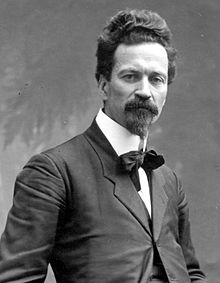Cesare Battisti (politician)
This article needs additional citations for verification. (January 2013) |
Cesare Battisti | |
|---|---|
 Cesare Battisti in Milan, 1915 | |
| Born | Giuseppe Cesare Battisti 4 February 1875 |
| Died | 12 July 1916 (aged 41) |
| Spouse | Ernesta Bittanti |
| Children | 3 |
Cesare Battisti (4 February 1875 – 12 July 1916) was an Italian patriot, geographer,[1] socialist politician and journalist of Austrian citizenship, who became a prominent Irredentist at the start of World War I.
Biography

He was born the son of a merchant at
In 1899, he married
A journalist by profession and a member of the Social Democratic Workers' Party of Austria, he was elected as a representative to the Tyrolean Landtag assembly at Innsbruck as well as to the Austrian Imperial Council (Reichsrat) at Vienna in 1911, where he vainly tried to obtain a status of autonomy for the Trentino region. Disgruntled by Austro-Hungarian attitudes to minorities in their empire, Battisti agreed to construct a military guide for the Italians to the Austrian provinces that bordered Italy.[3]
When Austria-Hungary mobilised in August 1914, Battisti fled with his family to the


After the
The smiling execution squad posed with his body for photographs, which when later published did severe damage to Austria's reputation. The author Karl Kraus applied a picture as frontispiece of his 1922 play Die letzten Tage der Menschheit (The Last Days of Mankind). Battisti is considered a national hero in Italy and several memorials were dedicated to him in Rome as well as in his hometown Trento and at the Bolzano Victory Monument. Both Trento and Bolzano had been under Austrian control until 1918.
See also
References
- S2CID 236675931.
- ^ "Ernesta Bittanti Battisti". Fembio.
- ^ Thompson 2009, p. 98.
- ^ Thompson 2009, p. 99.
Works
- Opere geografiche, (2005). Trento: La Finestra editrice (in Italian).
- Scritti politici (2006). Trento: La Finestra editrice (in Italian).
- Guida alle Giudicarie (1909). Trento: Monauni editore (in Italian).
- Il Trentino (1910). Novara (in Italian).
Bibliography
- Stefano Biguzzi (2008). Cesare Battisti. UTET (in Italian).
- Karl Kraus (1918; 1922). Gli ultimi giorni dell'umanità. Vienna (in Italian).
- Diego Leoni ed. (2008). Come si porta un uomo alla morte: la fotografia della cattura e dell'esecuzione di Cesare Battisti. Trento: Museo storico in Trento-Provincia di Trento (in Italian).
- Thompson, Mark (2009) [2008]. The White War: Life and Death on the Italian Front, 1915-1919. London: Faber and Faber. ISBN 978-0-571-25008-0. Retrieved 1 July 2023.
- Massimo Tiezzi (2007). L'eroe conteso. La costruzione del mito di Cesare Battisti negli anni 1916–1935. Trento: Museo Storico in Trento (in Italian).
External links
- Cesare Battisti: Italian hero, patriot, martyr
- The execution of Battisti – series of photographs
- Saltori, Mirko: Battisti, Cesare, in: 1914-1918-online. International Encyclopedia of the First World War.
